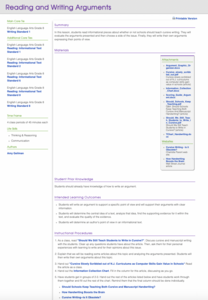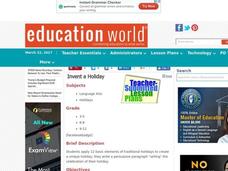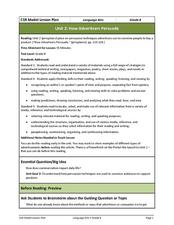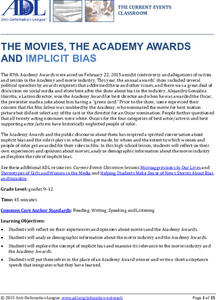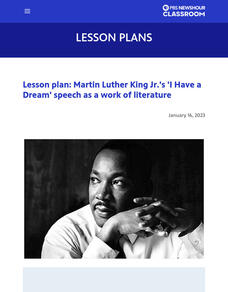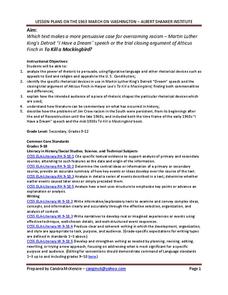Curated OER
Is That a Fact?
Investigate popular scientific claims and gather evidence to defend or argue against an author's stance. Writers synthesize information and compose their own "Really?" columns modeled after those found in the weekly "Science Times"...
Curated OER
Writing - The Persuasive Essay
Students, in groups, work together to develop a five-paragraph essay that defends the group's viewpoint on an assigned topic. Each student in the group writes one paragraph.
Curated OER
Persuasive Text: Vocabulary Charades
Students play charades to act out vocabulary words that have recently been introduced in class. In this vocabulary lesson students may work in groups or in pairs.
Curated OER
Understanding Propaganda
Students define propaganda and give examples from the mass media. In this propaganda lesson, students review examples of propaganda and then research versions of it in the mass media.
Curated OER
Reading and Writing Arguments
Should schools continue to teach cursive writing? After reading and considering the merits of a series of arguments on both sides of this proposition, class members choose a side of the issue and craft their own argument, drawing support...
Curated OER
Invent a Holiday
Who wouldn't want to create their own holiday? Use the 12 elements of a holiday to have learners of all ages create their own holiday. These days, it seems like we make any excuse for a holiday! Consider having some fun with your kids...
Curated OER
How Advertisers Persuade
This plan centers around the article "How Advertisers Persuade," although it is not included in the instructional activity itself. Get your class thinking about advertising, appeals, and techniques that companies use to get their...
Curated OER
Formal versus Informal Language
Engage in an activity that focuses on the concepts of formal and informal language use. Middle and high schoolers compare and contrast each style by using a Venn diagram that includes some examples. They read and hear a passage of lyrics...
Curated OER
New Gun Control Politics: A Whimper, Not a Bang
Using an article from The New York Times, students answer discussion questions about gun control. They are divided into four groups to research different standpoints on gun control, including the Executive Office, Congress, Gun Control...
Curated OER
Persuasion in Historical Context: The Gettysburg Address
The Gettysburg Address is a powerful text. Use it to teach persuasion and the importance of word choice. The activity detailed here includes a scaffolded background knowledge activity that includes image analysis of photos from the Civil...
Prestwick House
Writing Arguments in Response to Nonfiction
Emotional appeal or argument? That is the question. An informative lesson helps your class recognize the difference between a logical argument and an emotional appeal and learn how to craft an argumentative response. Writers develop a...
Anti-Defamation League
The Movies, the Academy Awards and Implicit Bias
"And the award goes to. . . " High schoolers investigate bias in the movie industry by reading articles, watching a short video, and examining data about the Academy of Motion Picture Arts and Sciences (AMPAS) membership, nominees, and...
EngageNY
Analyzing Language in a Speech: The Montgomery Bus Boycott Speech
Scholars analyze the use of active and passive voice in The Montgomery Bus Boycott speech and refer to an Active and Passive Sentences handout while viewing the text. Pairs of learners then work together to identify passive and active...
EngageNY
Mid-Unit Assessment: How Chávez Develops His Claims in the Commonwealth Club Address
Scholars complete a mid-unit 2 assessment, analyzing how César Chávez supports his claims in his 1984 speech, "Address to the Commonwealth Club of California." Learners focus on paragraphs 18 and 19 of the speech, answering text-based...
EngageNY
Speech Structure: Part 2 of the Commonwealth Club Address
Scholars continue reading and analyzing César Chávez's 1984 speech, "Address to the Commonwealth Club of California." Working with partners, they answer text-dependent questions about how governments and consumers affect working...
PBS
Dr. Martin Luther King Jr.’s ‘I Have a Dream’ Speech as a Work of Literature
To appreciate the oratory of Dr. Martin Luther King Jr.'s "I Have a Dream" speech, scholars examine the rhetorical devices and influences that make the speech so famous. They examine background information, conduct a close reading of the...
Curated OER
Paint My Counties: Map Coloring the Counties of Arizona
Fourth graders identify the counties of Arizona. In this social studies lesson, 4th graders color a county map of Arizona using the fewest number of colors possible. Students write a persuasive paragraph.
Curated OER
Famous Kansans
Fourth graders research famous Kansans. For this language arts lesson, 4th graders select a famous Kansan and write a persuasive nomination for inclusion in a Hall of Fame.
Literacy Design Collaborative
The Art of Persuasion: How Rhetorical Devices Influence Audiences
Scholars analyze a variety of text to identify the development of claims and persuasive techniques writers use. In each text, pupils determine the argument and the persuasive techniques and complete a task introduction worksheet. The...
Curated OER
Dig In
Students identify where vegetables originate from. In this agriculture instructional activity, students use a search engine to find out where certain vegetables originate from. Students plot the information onto a world map.
Classroom Law Project
What do cartoonists see in this election?
Cartoons from the 2008 Presidential election provide the text for a lesson designed to help learners understand how political cartoonists use persuasive techniques to present a point of view.
Albert Shanker Institute
Making the Case for Equality: A Comparison
Martin Luther King Jr's " I Have a Dream" speech and Atticus Finch's closing argument during the trial of Tom Robinson both address the societal need to overcome racism. After examining the rhetorical devices and figurative language used...
Curated OER
Deduction
Students investigate the linguistic devices used by writers to create meaning. In this writing instructional activity, students discover why writers write in different ways showing examples of different types of text. After reading each...
Curated OER
Language Arts: Two Specific Documents
Students are able to read and analyze the essential parts of two specific types of documents, the informed consent document and the position paper, used by scientists to communicate information about their research to two different kinds...
Other popular searches
- Persuasive Text Examples
- Persuasive Text Samples
- Persuasive Text Readings
- Identifying Persuasive Text
- Biased Persuasive Text
- Persuasive Text Writing
- Esl Lessons Persuasive Text
- Persuasive Text Lesson
- Persuasive Text and Writing
- Persuasive Text Lesson Plans
- Reading Persuasive Texts
- Non Fiction Persuasive Texts






